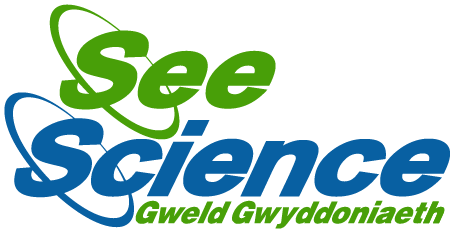Previous projects
Gopher Science Laboratory: Royal Society of Biology
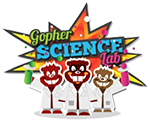 Aim of the project
Aim of the project
- The Gopher Science Labs project supports transition from primary to secondary school with peer-to-peer learning across age groups.
- Secondary students learn how to deliver the range of Gopher Science Lab activities to primary pupils. During this process the secondary students develop their skills in communication, innovation and increase their self-confidence.
The Gopher Science Lab activities
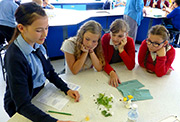 The Gopher Science Labs activities are simple hands-on science activities designed to build children's confidence and encourage their natural curiosity to find out how and why everyday things work.
The Gopher Science Labs activities are simple hands-on science activities designed to build children's confidence and encourage their natural curiosity to find out how and why everyday things work.
The Gopher Resource booklet
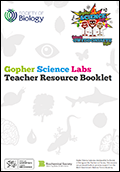 The Gopher Resource booklet contains 10 activities. Each activity includes teacher's notes which describe how to carry out the activity. You can download the resource booklet here (1.5MB pdf).
The Gopher Resource booklet contains 10 activities. Each activity includes teacher's notes which describe how to carry out the activity. You can download the resource booklet here (1.5MB pdf).
Gopher Resource booklet is a transition phase initiative funded by the Welsh Government through the National Science Academy and delivered by the Royal Society of Biology.
PSTT – Science Enquiry Wales
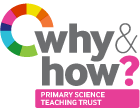 See Science managed the project 'Science Enquiry: Wales' which was funded by the Primary Science Teaching Trust. This exciting project was set up to support Scientific Enquiry and the transition between primary and secondary schools in Wales.
See Science managed the project 'Science Enquiry: Wales' which was funded by the Primary Science Teaching Trust. This exciting project was set up to support Scientific Enquiry and the transition between primary and secondary schools in Wales.
The project process
Secondary schools and their feeder primary schools collaborate with each other and with STEM (Science Technology Engineering & Mathematics) Ambassadors – people who want to share their passion for their careers to encourage pupils of all ages to take an interest in STEM Subjects.
The schools and Ambassadors work together to develop a sequence of lessons which will improve pupils' science skills and knowledge, which pupils then apply in an investigation. This investigation is carried out in the classroom with the teacher and the STEM Ambassador working together.
D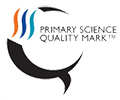 uring their participation in the project teachers are made aware of the Primary Science Quality Mark (PSQM). A PSTT College member attends the CPD course to speak of their experience of PSQM, the benefits of PSQM and how to apply for funding to run it.
uring their participation in the project teachers are made aware of the Primary Science Quality Mark (PSQM). A PSTT College member attends the CPD course to speak of their experience of PSQM, the benefits of PSQM and how to apply for funding to run it.
Project outcomes
- An improvement in the standards achieved by pupils in science skills.
- Greater variety of recording methods used in science lessons.
- An increased understanding by teachers in both phases of the progression in science skills.
- A greater awareness of the STEM Ambassadors programme.
- An improvement in pupils' attitudes towards science and scientists.
Videos
To view each video, click on the thumbnail: the Youtube or Vimeo video will launch.
| Cardiff Cluster See Science / PSTT video (2018) (Vimeo video) | 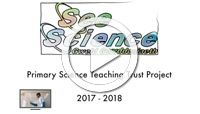 |
| Teachers from the Ysgol Bro Gwaun / Pembrokeshire school cluster talk about their experiences during the Science Enquiry: Wales project and reflect on the learning outcomes, their personal development and the benefits to the pupils. Includes sequences of pupils demonstrating the results of their investigations. (Vimeo video) | 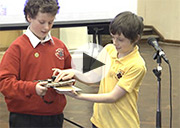 |
Feedback from teachers participating in the project
- "I think the results speak for themselves in terms of the project being a success. 94% of the children asked said they would like to take part in a similar project again. Probably the most significant finding was that 95% of children believed the project helped them improve their skills and understanding. From the teacher's perspective, we find these results underpin how important the project was in developing the children's knowledge and enjoyment of the subject." Chris Davies Roath Park Primary School
- "The children really enjoyed the project and because they knew it was to inform others, they ensured they researched the topic thoroughly. The project allowed the children to be both independent and to work collaboratively. In order to produce an i-movie, the groups realised that their research needed to be accurate and detailed. The children's skills progressed in science because of the depth of learning they were required to do in order to present the i-movie, but their skills in I.T. were also called upon when editing needed to be done, and music added where necessary. All in all, the project left the children with a sense that science is fun." Louise Fry and Louise Tanner. Lakeside Primary School
- "The project has definitely increased understanding in both phases. The opportunity for primary schools to present and showcase their work in interactive displays was fantastic. It gave secondary teachers a greater understanding of the depth of scientific knowledge the primary pupils have acquired and the experiences undertaken." Cardiff High School
- "The project has definitely strengthened transition links, made us consider teaching skills in different ways and equipped pupils with a stronger drive to pursue a career in science in the future. Many thanks all!! Please feel free to pilot any future schemes on the wonderful Bro Gwaun family of schools in the future." Emma Bowen, Ysgol Bro Gwaun
- PSTT Celebration Day "The resources provided have been invaluable – the planning sheets and example experiments were very useful. I will definitely be using them in future." Abigail Davies, Holy Name RC Primary School
- "The children's literacy skills were developed through different means of recording and presenting their work – writing comics, recording iMovies, creating iBooks, developing oral reasoning skills through questions posed in concept cartoons and developing thinking/mind mapping to convey learning." Jeff Lansing, Murch Junior School
- "I think that working with a STEM Ambassador has had a huge impact on pupils' attitude to Science …lots of them have said that they would love to be a R&D engineer (like Stuart) as it sounds interesting and exciting. Stuart's visit was inspiring – the pupils referred to things he had said during Science lessons." Abigail Davies, Holy Name RC Primary School
- "The fair test board is now part of all our investigations and I feel confident that the children have a much greater understanding. I have cascaded the fair test board to all KS2 teachers. The board was introduced to them during a staff meeting where I also showed examples of my children's work." S Lewis, Goodwick Primary School
Feedback from pupils participating in the project
- "I enjoyed sharing the information that I have learned to other pupils and people. We also worked together more than usual. I liked performing because it was nice to show what we did to other schools. Ours was unique and it was nice to show that." Pupils from Roath Park Primary School
- PSTT project "Stuart (STEM Ambassador) was really interesting – I didn't realise that there were so many different jobs a scientist could do." Pupil at Holy Name RC Primary School
- "After Stuart's visit I've been looking at different things and wondering about the scientists who designed them." Pupil at Holy Name RC Primary School.
- "I never used to like science before, but now I think it's great. I understand it better now. It just makes sense." Charlotte, Yr 6
- "I have really enjoyed doing different experiments and learning some new things in science. I enjoy how it makes me think about things and predicting what I think is going to happen." Sam, Yr 6
Milk and More – Biochemical Society
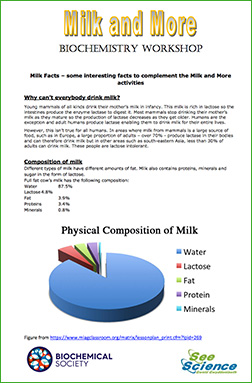 Milk and More is a new workshop which has been developed by See Science and funded through the Biochemical Society Scientific Outreach Grant which introduces biochemical science for KS2/3 audiences. It consists of 4 different hands-on milk based activities, as well as some ideas of other food-related experiments, all suitable for use within lesson time or as STEM Club activities.
Milk and More is a new workshop which has been developed by See Science and funded through the Biochemical Society Scientific Outreach Grant which introduces biochemical science for KS2/3 audiences. It consists of 4 different hands-on milk based activities, as well as some ideas of other food-related experiments, all suitable for use within lesson time or as STEM Club activities.
You can download a zip file of all the resources here.
Read about our visit to Castle Dairies, Caerphilly here
 The Biochemical Society has grants to increase participation in the molecular biosciences at school level and beyond through engagement activities. Applications for funding are invited to assist with the direct costs associated with an event and expenses incurred. The type of events funded could include:
The Biochemical Society has grants to increase participation in the molecular biosciences at school level and beyond through engagement activities. Applications for funding are invited to assist with the direct costs associated with an event and expenses incurred. The type of events funded could include:
- Activities for a science club
- Workshops for students or teachers
- Lectures from research scientists
More information here.
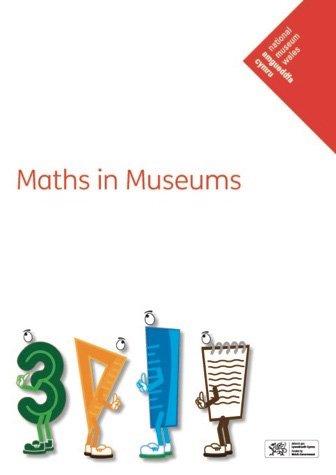 Maths in Museums – Amgueddfa Cymru – National Museum Wales
Maths in Museums – Amgueddfa Cymru – National Museum Wales
Maths in Museums is a digital resource to support the numeracy framework in primary schools.
22 bilingual activities for year 6 pupils were designed to support geometry, number, data and measuring skills.
The toolkit was developed in partnership with See Science. The toolkit is sponsored by the National Science Academy grant scheme.
You can download the resources pdf here.
